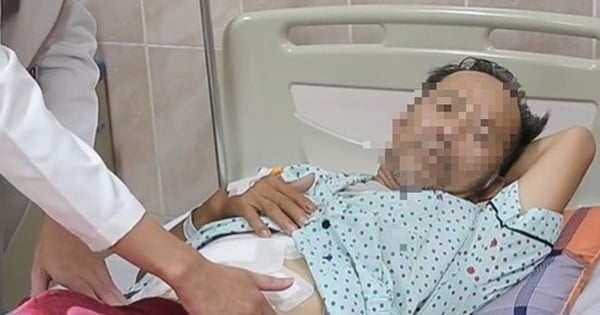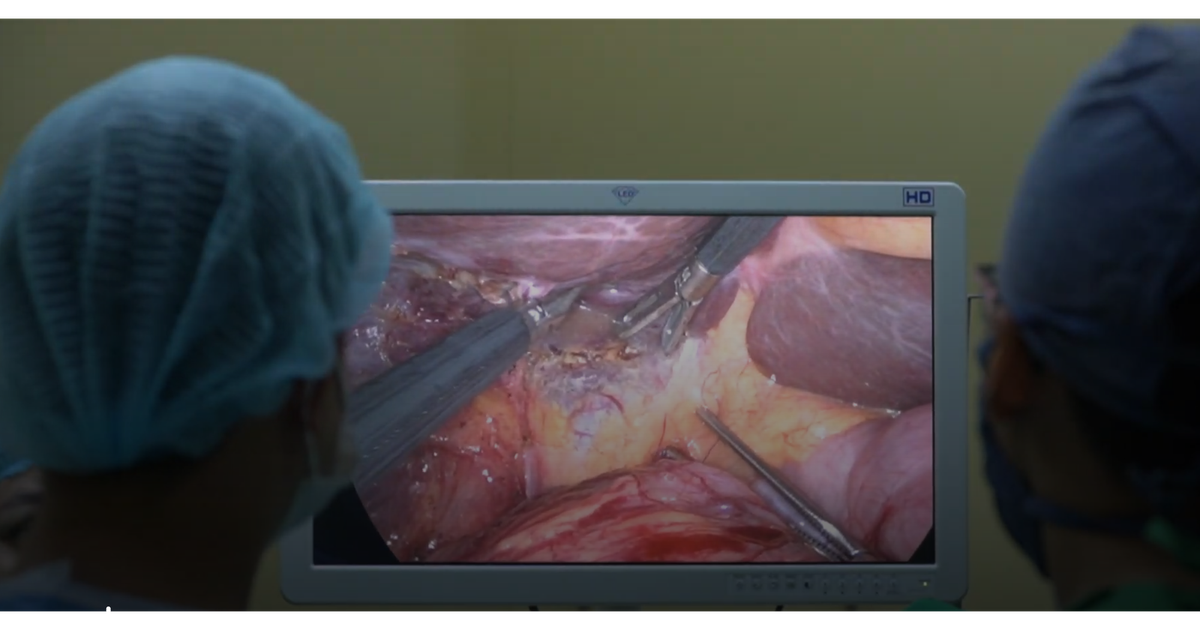Making a mistake, the man was hospitalized after 16 years of living peacefully with hepatitis B.
A 62-year-old man came to MEDLATEC General Hospital for examination due to dark urine, fatigue and loss of appetite for 1 week.
During this check-up, the patient was unexpectedly hospitalized for treatment to avoid serious disease progression, which could be life-threatening, due to an outbreak of chronic hepatitis B.
 |
| Doctors at Medlatec General Hospital are consulting with patients. |
Due to subjectivity and carelessness, many people buy medicine to take on their own, or stop taking it halfway, which can cause unpredictable health consequences. The case of Mr. PVB (63 years old, Ha Nam) is a specific example.
Mr. B. came to MEDLATEC General Hospital for examination due to dark urine and loss of appetite. Mr. B. said that he was diagnosed with chronic hepatitis B in 2009. From the time of diagnosis until March this year, he has always taken UCVR TDF according to the doctor's prescription.
The most recent test in March showed that his liver enzymes were stable and his viral load was below the threshold. However, in the next 3 months, he subjectively thought that his hepatitis B was under control, so he took medication every other day, taking one pill every other day.
For about a week now, he has felt like he has no appetite, is tired, has increasingly dark urine, and produces little urine. Seeing these “unhealthy” signs, his family advised him to go to MEDLATEC General Hospital for a health check.
After receiving the results of the medical examination, ultrasound and tests, the family was extremely shocked when Mr. B. was ordered to be hospitalized for inpatient treatment to prevent the disease from progressing further, because this was an outbreak of chronic hepatitis B.
BSCKI. Nguyen Thi Ngoai, Infectious Diseases specialist, MEDLATEC General Hospital, received the patient and said that after taking the patient's medical history of chronic hepatitis B, the risk factor of taking medication every other day, plus the reason for the visit due to dark urine, loss of appetite, and examination of the organs did not detect any abnormalities, the preliminary diagnosis was to monitor the outbreak of chronic hepatitis B.
At the same time, the patient is advised to do hematology, biochemistry, microbiology, and abdominal ultrasound tests to make a definitive diagnosis.
As predicted by the doctor, liver enzyme test results (AST, ALT) increased 34 times, Albumin: decreased, AFP: increased, especially HBV DNA test - a test to determine the quantity or concentration of virus in the blood of patients infected with hepatitis B virus gave the result of 10^7 IU/ml. Abdominal ultrasound showed a slightly coarse liver image.
From this result, patients diagnosed with chronic hepatitis B outbreak should be advised to be hospitalized for inpatient treatment to avoid severe disease progression.
Associate Professor, Dr. Trinh Thi Ngoc, Infectious Diseases expert (MEDLATEC Healthcare System), former Head of the Department of Infectious Diseases (Bach Mai Hospital), Vice President of the Vietnam Liver and Biliary Association with more than 40 years of experience shared that chronic hepatitis B requires a long time of treatment, there is currently no cure, antiviral drugs are prescribed to inhibit virus replication, limit liver damage from progressing to cirrhosis and liver cancer.
Because of the long time required for management, examination and treatment, in practice, I have encountered cases where people were tired of wasting time and money and stopped taking medication on their own.
At the same time, experts said, there are cases where only liver enzymes are increased, but lead to liver failure and need for dialysis. The cause is due to lack of treatment, or arbitrarily stopping medication. This is a fairly common condition today, leaving a burden on the health sector and the health and life of the patient.
Sharing the roadmap for Mr. PVB's health management in the coming time, Associate Professor, Dr. Nguyen Thai Son, microbiology expert, Deputy Director of MEDLATEC Testing Center said that because patient B. did not comply with the treatment regimen, it led to the bad consequence of a virus outbreak, so in addition to needing to be hospitalized for emergency treatment, the patient needs to comply with the doctor's treatment prescription.
After 1 month of treatment, if the condition does not improve, the patient needs to do HBV Genotype test, drug resistance mutation to assess the risk of hepatitis B drug resistance to change the treatment regimen. Because patients who voluntarily stop taking medication often have a very high risk of drug resistance.
Experts recommend that people should follow the examination and treatment schedule as instructed by their doctor. Or go to the doctor immediately if there are signs of suspected hepatitis B such as fatigue, nausea, loss of appetite, muscle pain, fever, yellow skin, yellow eyes, dark urine, etc.
Viral hepatitis is an infectious disease caused by the hepatitis B virus (HBV). Acute and chronic hepatitis B, if not strictly managed and treated, can progress to cirrhosis, cancer, and even death.
There is currently no cure for chronic hepatitis, so to limit liver damage, patients need to be equipped with the following principles: do not stop antiviral treatment on your own, or only stop treatment when prescribed by a doctor. At the same time, periodically check to assess the possibility of HBV reactivation after stopping the medication.
Regular health check-ups twice a year, or as specifically prescribed by your doctor. Follow a scientific and reasonable diet and lifestyle: Do not drink alcohol; do not eat too spicy, too salty, too fatty foods; choose lean meat, low in fat; increase green vegetables, fruits; whole grains (barley, brown rice, whole wheat noodles).
In addition, to actively prevent chronic hepatitis B effectively, patients need to be vaccinated against hepatitis B for infants, young children, people with chronic diseases and those who do not have antibodies against HBV.
Do not share needles or personal items such as toothbrushes, nail clippers, razors, etc. with anyone.
Have monogamous sexual relations with one partner. If the other person has hepatitis B, use protection during sex. Do not abuse stimulants such as alcohol and tobacco to avoid harming the liver.
Source: https://baodautu.vn/benh-nang-them-vi-tu-y-dieu-chinh-lieu-thuoc-d220331.html


![[Photo] "Beauties" participate in the parade rehearsal at Bien Hoa airport](https://vstatic.vietnam.vn/vietnam/resource/IMAGE/2025/4/11/155502af3384431e918de0e2e585d13a)



![[Photo] Looking back at the impressive moments of the Vietnamese rescue team in Myanmar](https://vstatic.vietnam.vn/vietnam/resource/IMAGE/2025/4/11/5623ca902a934e19b604c718265249d0)

























![[Photo] Summary of parade practice in preparation for the April 30th celebration](https://vstatic.vietnam.vn/vietnam/resource/IMAGE/2025/4/11/78cfee0f2cc045b387ff1a4362b5950f)



























































Comment (0)